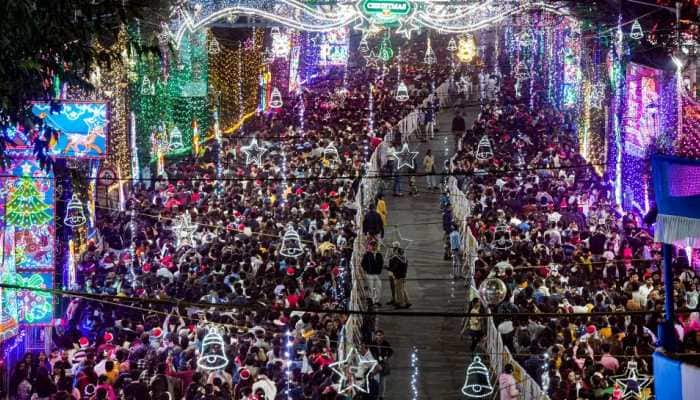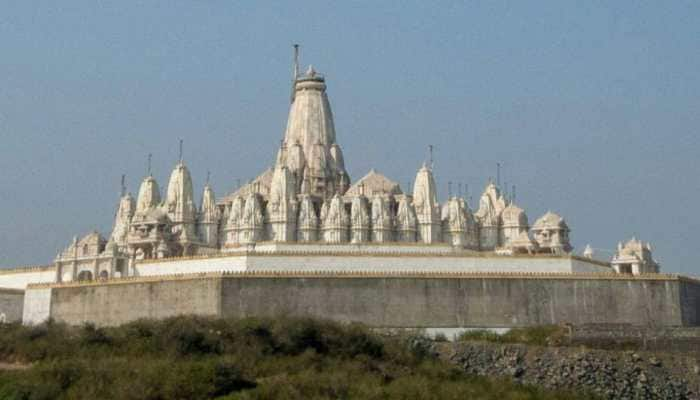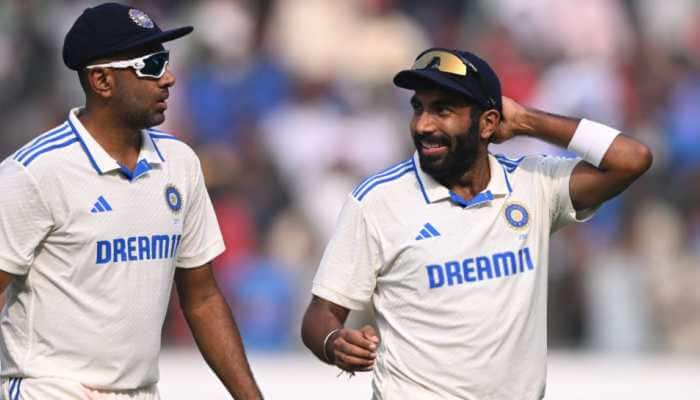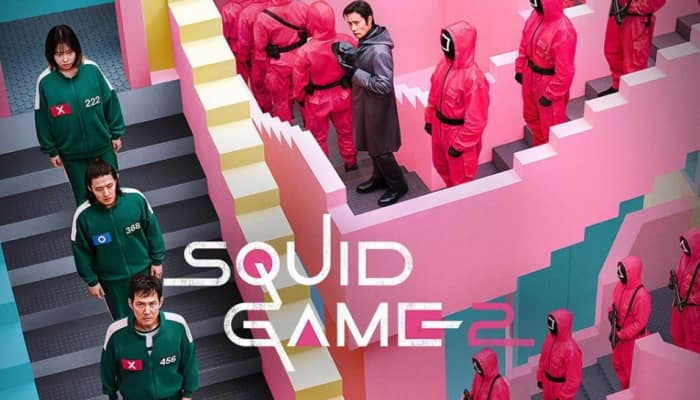Zee JLF 2018: With record footfalls, stellar debates and conversations, event ends on a high note
The Festival has also won the hearts and minds of the younger generation.
Trending Photos
)
Jaipur: The eleventh edition of the Zee Jaipur Literature Festival, the world’s largest literary festival which is free and open to all, ended on a high note on January 31, 201. The Festival announced half million footfall over the past five days - a record number and higher by around 23% over last year.
Conversations on the final day showcased a multiplicity of voices, from debut novelists to experts and veterans, reflecting the truly global and relevant, local reach of the Zee Jaipur Literature Festival. With more than 60% of audiences under the age of 25, the Festival has also won the hearts and minds of the younger generation hungry for social justice, equality and environmental accountability, providing a platform for ideas pertinent to the next generation.
As the day began, in the session The Fictional Leap, celebrated Kannada author Vivek Shanbhag asked the prolific author Kiran Nagarkar what he considers to be his greatest failure in writing. Nagarkar replied that his novel God's Little Soldier was an example of an instance when he could not convey his message to readers. The book, about a child named Zia Khan who, after having turned into a terrorist, is confronted with the question, how many people should he kill for his god, got a lukewarm response from readers. The author felt that he had failed to transmit to his readers the essence of the book that “there is only one god and that is life; everything else is irrelevant”.
Jeet Thayil, the winner of the DSC Prize for South Asian Literature, and shortlisted for the Man Booker Prize, conversed with Sampurna Chattarji, over the release of his new book The Book of Chocolate Saints. Novelist Chattarji questioned Thayil about the links he establishes between drug addicts, saints, and poets in his work.
Thayil observed that the three had much in common: “They give up on the things the rest of us treat as basic human rights, one of which is the right to pleasure.” Thayil elaborated that addicts derive “their only pleasure” from substance abuse, trading it for happiness from all other aspects of life. Drawing analogies with poets and saints, he remarked, “It’s almost like doing prison time.”
How did Donald Trump become President of the most powerful country in the world? British Journalist Matt Frei, author of Only in America and maker of a documentary called The Trumps: From Immigrant to President, explained the Trump phenomenon and what it means for American and world politics.
Frei started the discussion with Suzy Hansen with a startling image, “Imagine that you were stuck on an island or cave in 2015 and you wake up in 2017 and look at your twitter feed, and you see Donald Trump posting very unpresidential things, you would think you are on some great recreational drugs.” He described the victory of Trump as “incomprehensible,” but not unusual for American presidential politics over recent decades.
A gripping session, Why Being Fair Matters, Especially When It Doesn’t, saw Jyoti Gupta in conversation with Puneeta Roy , with recitations by Jovan Mays, Poet Laureate from Aurora, Colorado and Melizarani T. Selva.
Spoken word poet and journalist Melizarani T Selva recounted how her mother had taught her to “put her face on” with two different face creams and a layer of baby powder. She pointed out how the Malay word for white is equated with royalty while the word for dark, “Hitam” translates closely to “cute”! “We teach our daughters that being dark is less pretty through this vague kind of beauty.”
In the strife-torn times that countries like Syria, Palestine and other parts of the Arab world are currently grappling with, a session that celebrated Arab culture was deeply relevant. The true impact of literature lies in speaking the unspoken and the Festival panel, comprising authors with roots in Syria, Palestine, Lebanon and Israel, delved within the layers of the ancient region’s vast literary wealth, contextualizing its literature against its uncomfortable contemporary reality. The session had Alia Malek, Rabih Alameddine, Raja Shehadeh in conversation with Susan Abulhawa in Writing the Arab World.
The Rohingya Crisis discussed the role of Nobel laureate and the first incumbent state counsellor of Myanmar Aung San Suu Kyi. She was heralded as the champion of change and an advocate of peace but her choice to not intervene in the crisis has shocked everyone in international circles.
Talking about the steps that she can take to deal with the issue, Perry said, “She has a number of options at her disposal. She has a parliamentary majority to apply pressure.” State controlled media in Myanmar – over which Suu Kyi has some influence – has been instrumental in fermenting ethnic hatred against the Rohingyas: they have gone to the extent of calling them “human flee.” She controls foreign office and she must involve the international community and observers, Perry added. Swami pitched in by commenting, “Her story holds out a lesson that a political leader should not be confused with a saint.”
Rajasthali: Dharti ri Koonkh featured notable Rajasthani writers Abhimanyu Singh Arha, Bulaki Sharma and Reena Menaria in conversation with Arvind Singh Ashya on the legacy of the language which was amongst the richest languages in 16th century India and traced its evolution from a metered form to the inclusion of modern and contemporary styles of writing, celebrating the rich living heritage of Rajasthani literature in its many moods and manifestations.
Another panel on local media Rajasthan: Badalte Mahaul Mein Media, featured Veteran journalist and writer Laxmi Prasad Pant, Falguni Bansal, Rajendra Bora, Vinod Bhardwaj and Yash Goyal examining Rajasthani media and how it balances the local with the national and international.
The session explored social, economic and political issues reported in Rajasthan; the challenges the region’s media faces, the mounting pressures of new media and that of a society confronting change even as it struggles to retain its age-old identity. A keen tourist culture, a mix of the cosmopolitan and the traditional in the midst of a colourful and vibrant landscape, and a largely inhospitable terrain all form part of the Rajasthani daily tableau. This focal session with Rajasthani media dwelled on the complexity and content of its reportage in the context of the state’s contemporary reality.
When the #MeToo movement took the world by storm last year, there was an eruption of voices from across the world: many came to support it, and many came to critique it. #MeToo effectively brought to public attention the severity and common nature of sexual harassment that permeates the fabric of our society. It was in the wake of this burning issue that the ZEE Jaipur Literature Festival chose the subject for its closing debate.
Writer-journalist Bee Rowlatt followed, who hailed the #MeToo movement as a “collective outcry against male sexual violence.” Eminent journalist Vinod Dua agreed that men indeed do have it too easy. They are raised with a sense of entitlement, and controversial statements like “boys make mistakes” or “one minor rape” give them the power to get away with being sexual violence perpetrators.
Ruchira Gupta said that even if only a minority of men decide to abuse the power they have been bestowed with, it becomes problematic for the whole society. She asserted that someone “touching your cheek, pulling your bra strap, and poking your waist” is “rape culture” and should be called out for what it is. Lawyer Pinky Anand brought in the legal dimensions and limitations in the pursuit of justice for sexual harassment victims.
She pointed out that this inadequacy has necessitated the growth of social and civil activism in recent times, as an increasing number of women have spoken out about violence meted out against them. Making a bold statement, Sandip Roy said that real change will come when a woman is able to walk into a police station to register an FIR on sexual harassment charge, and not be asked what she was drinking or wearing.
The audience ultimately attested through the vote that men certainly do have it easy. However, Bee called out the immense polarization around the issue, and ended the closing debate of the Zee Jaipur Literature Festival with a quote from Mary Wollstonecraft: “I do not wish women to have power over men, but over themselves.”
The eleventh edition of the Festival was supported by iconic Indian and Global brands who believe that literature is an intrinsic part of a vibrant culture and society. Zee Entertainment, Cox and Kings, AU Small Finance Bank, Google, Dove, Dettol, Mahindra, Amity University Facebook, Rajasthan Patrika, Dainik Bhaskar, Red Fm, Rajasthan Tourism have all renewed their commitment to this celebration of the word, and increased their engagement with the Festival.
The Zee Jaipur Literature Festival welcomed new partners Bank of Baroda, Tanishq, Diageo, Assam Tourism, Nokia, Pepsi, Mathrubhumi and ABP. It is these partnerships that make possible the Festival's robust growth and reach.
This year the Festival was supported by over a dozen countries and their embassies, bringing leading authors and experts from their respective countries to the Festival.
A festival like Zee Jaipur Literature Festival cannot happen without the support of the hotel partners - Diggi Palace, Clarkes Amer, Taj Hotels, The Lalit, Marriot and Grand Uniara. Several foundations and publishers also continue to support the Festival year after year.
Aside from literary debate and dialogue, the Festival showcased amazing art, cultural and musical offerings setting this grand celebration of the word against the backdrop of built and cultural heritage.
Celebration of Art
As in recent years the Diggi Palace gardens host not just the venues but also a range of artworks to inspire the eyes as much as the ears. Where else but at the Zee Jaipur Literature Festival can you celebrate art for art’s sake? With an association with the venerable Museum of Modern Art (MoMA), installations by legendary artists like Satish Gupta, awards like the Ojas Art Award and the Oxford Book Cover Award, and multiple panels throughout the programme, the Festival explored the vast depth of the visual arts and its close relationship with literature.
Sculptor and muralist Satish Gupta showcased his exquisite sculpture in copper titled Conference of the Birds, inspired by the 12th-century Persian poem Attar of Nishapur, with birds representing human faults in intricate detail. Bringing the splendour of art into tangible form was Theatre of Stories by Wolf with Ritu and Surya Singh, self-taught artists based in Jaipur who create installations and experiences from scrap and discards. The Ojas Art Awardees Anwar Chitrakar in the Master Category and his nephew Uttam Chitrakar in the Protégée Category also showcased their works at the Festival
Music
As every year, the Festival invited some of the best names in world and Indian Music with highlight performances from Kailash Kher and Kailasa, Shilpa Roa ft. Talvin Singh, Real Sugar featuring Paban Das Baul and Sam Mills, David Gray, and the Afro Celt Sound System. The Music Stage, for the very first time, also featured sessions on music including the Word Jazz: Spoken Poetry with Live Music and Confessions of a Rock Biographer with Philip Norman.
Heritage Evenings
Two stunning cultural evenings supported by Rajasthan Tourism showcased the tremendous beauty of the city’s iconic monuments, the Hawa Mahal and the Amber Fort. Under the Stars at Hawa Mahal featured The Troth-Usne Kaha Tha, a multimedia dance and theatre production presented by Akademi, the UK’s leading producer of Indian dance, marking the centenary of World War I.
A Majestic Evening at Amber Fort featured a sarangi recital by Ustad Kamal Sabri and a special showcase Hazaaron Khwaishein Aisi… a tribute to the late ghazal maestro Jagjit Singh by singer, songwriter and composer Shekhar Ravjiani.
Awards
This year the Zee Jaipur Literature Festival hosted multiple awards celebrating the diversity of literature, languages and art in the country. Ojas Art Award, now in its fourth year, celebrated the art of Pattachitra, the Oxford Book Cover Prize recognized talent in and importance of Book Cover designing, the Vani Prakashan Distinguished Translator Award reinforced the relevance of translations in the world of literature, Shri Dwarka Prasad Agarwal Award recognized exemplary Hindi writing and the Kanhiayalal Sethia Award for Poetry celebrated the art form in honour of the legendary poet it is named after.
The dates for the 2019 edition of the Zee Jaipur Literature Festival are 24th – 29th January, 2019 and this unique celebration of literature will return with speakers including the likes of Anuk Arudpragasam, Dambisa Moyo, Devdutt Pattanaik, Mahesh Dattani, Mrinal Pande, Noam Chomsky, Robert Plant, Rohinton Mistry and Tilda Swinton.
Stay informed on all the latest news, real-time breaking news updates, and follow all the important headlines in india news and world News on Zee News.
Live Tv







)
)
)
)
)
)
)
)
)
)
